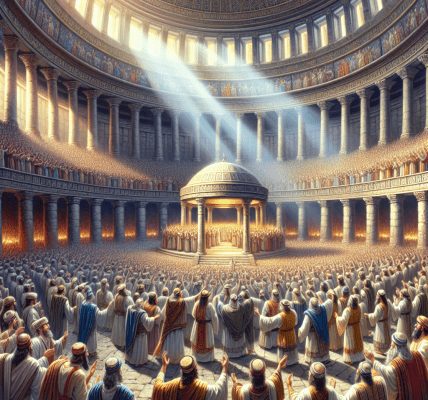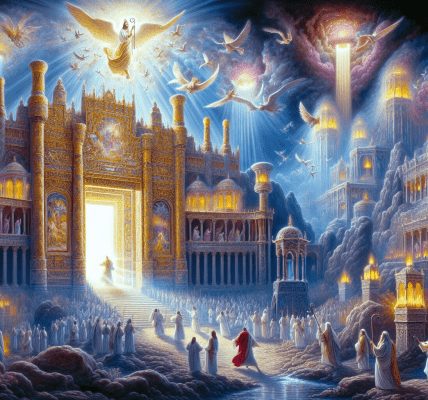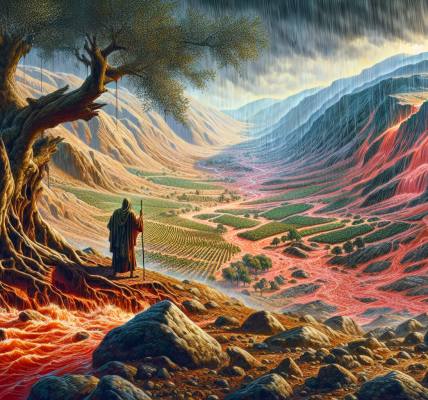**The Anointing of Saul: A Humble Seeker Chosen by God**
The sun hung low over the hills of Benjamin, casting long shadows across the rugged terrain. A tall, handsome young man named Saul, son of Kish, strode alongside his servant, their sandals kicking up dust from the dry earth. Saul’s brow furrowed with concern as he scanned the horizon. His father’s donkeys had wandered off days ago, and despite their diligent search through the hill country of Ephraim and the land of Shalishah, the animals were nowhere to be found.
“Perhaps we should turn back,” Saul sighed, running a hand through his dark hair. “My father will stop worrying about the donkeys and start worrying about us instead.”
But the servant, a sharp-eyed man who had served Kish’s household for years, hesitated. “Listen,” he said, “there is a man of God in this city—a seer highly respected. Everything he says comes true. Maybe he can tell us which way to go.”
Saul frowned. “If we go, what can we give him? Our bread is gone, and we have no gift for the man of God. What do we have?”
The servant reached into his pouch and pulled out a small silver coin. “Look, I have a quarter shekel of silver. I can give that to the man of God so he will tell us our way.”
Saul nodded slowly. “Good idea. Let’s go.”
### The Divine Appointment
The two travelers made their way to the town where the seer lived. As they climbed the path toward the city gate, they passed young women coming out to draw water.
“Excuse me,” Saul called to them. “Is the seer here today?”
One of the girls nodded eagerly. “Yes, he’s just ahead of you. Hurry—he arrived in town today because there is a sacrifice at the high place. As soon as you enter the city, you’ll find him before he goes up to eat. The people will not eat until he comes, for he blesses the sacrifice. Afterward, those who are invited will eat. Go up now; you should find him right away.”
With renewed hope, Saul and his servant quickened their pace. Just as they entered the city, a man descended the steps toward them. It was Samuel, the prophet and judge of Israel, a man who carried the weight of God’s word with quiet authority.
The Lord had spoken to Samuel the day before: *”About this time tomorrow, I will send you a man from the land of Benjamin. Anoint him ruler over my people Israel; he will deliver them from the hand of the Philistines. I have looked on my people, for their cry has reached me.”*
Now, as Samuel’s eyes fell upon Saul, the Lord spoke again: *”This is the man I told you about. He will govern my people.”*
Saul, unaware of the divine significance of this moment, approached Samuel near the gate. “Excuse me,” he said respectfully. “Can you tell me where the seer’s house is?”
Samuel smiled knowingly. “I am the seer. Go up ahead of me to the high place, for today you will eat with me. In the morning, I will send you on your way and tell you all that is in your heart. As for the donkeys you lost three days ago, do not worry—they have been found. And to whom does all Israel desire, if not to you and your father’s family?”
Saul’s eyes widened in disbelief. “But I am from the smallest tribe of Israel, and my clan is the least of all the clans of Benjamin. Why would you say such a thing to me?”
Samuel did not answer directly. Instead, he led Saul and his servant to the banquet hall, where about thirty guests had gathered. He seated Saul at the head of the table and instructed the cook to bring the special portion reserved for the guest of honor—a choice cut of meat set aside for this very occasion.
### The Anointing
The next morning, Samuel rose early and walked with Saul to the edge of the city. As they paused on the quiet road, Samuel turned to the young man. “Send your servant ahead,” he said gently. “I have a word from God for you alone.”
When the servant had gone on, Samuel took out a flask of sacred oil. The morning sun glinted off the vessel as he raised it. Then, in a moment charged with divine purpose, he poured the oil over Saul’s head and kissed him—a sign of honor and consecration.
“The Lord has anointed you ruler over his inheritance,” Samuel declared, his voice steady with conviction. “You will govern his people Israel and save them from the hand of their enemies. This will be the sign to you that the Lord has appointed you: When you leave me today, you will meet two men near Rachel’s tomb at Zelzah. They will tell you the donkeys have been found and that your father is now worried about you. Then, at the great tree of Tabor, three men going up to worship God at Bethel will meet you. One will be carrying three young goats, another three loaves of bread, and another a skin of wine. They will greet you and offer you two loaves of bread, which you will accept. After that, you will come to Gibeah of God, where a Philistine outpost is. As you approach the town, you will meet a procession of prophets coming down from the high place with lyres, tambourines, flutes, and harps being played before them. And the Spirit of the Lord will come powerfully upon you; you will prophesy with them and be changed into a different person. When these signs are fulfilled, do whatever your hand finds to do, for God is with you.”
Saul stood in stunned silence as the weight of Samuel’s words settled upon him. The donkeys, the search, the chance encounter—none of it had been coincidence. The hand of God had guided his steps, leading him not to lost livestock, but to a destiny far greater than he had ever imagined.
As he turned to leave, his heart pounded with a mixture of awe and trepidation. The journey home would be different now. The Spirit of the Lord was upon him, and the path ahead would unfold according to the divine will.
And so, with the morning light stretching across the land, Saul walked forward—no longer just the son of Kish, but the Lord’s anointed, chosen to lead Israel into a new era.




